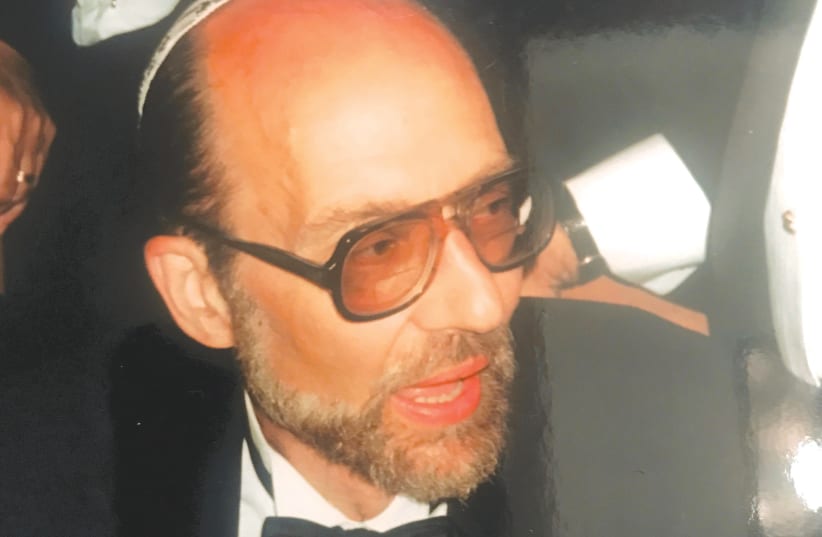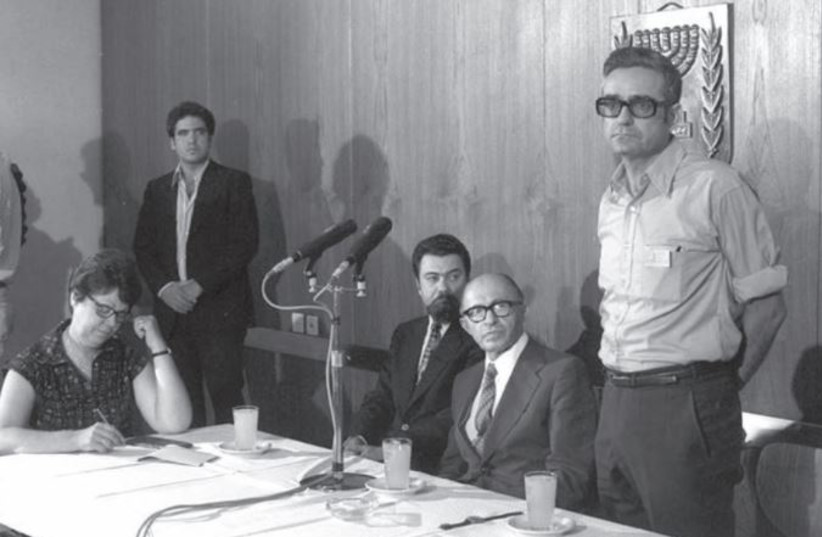My father, Bernard Dov Troy, died last Thursday at 94, shortly after meeting his first great-grandchild at the second Passover Seder. That child – my grand-nephew – is named “Pela” – meaning miracle, wonder, marvel. Those words describe Dad’s life. He emerged from the 1930s’ Great Depression and the Holocaust’s Great Despair to witness – and join – two counter-cultural, history-making adventures: the launching of Israel and the transformation of so many American Jews from outsiders to insiders. Pessimists will say he died with both wonders threatened, even doomed. Realists will draw reassurance from his trajectory; he saw Jews overcome far worse.
Bernie Troy was born into a seemingly perpetual state of Jewish statelessness, homelessness, and precariousness. By his 15th birthday – in 1945 – the Nazis had slaughtered six million fellow Jews. But rather than being imprisoned in bitterness, Dad and his peers liberated themselves with that wonderful miracle cure: hope. As Zionists, they didn’t whine; they dreamed of a better tomorrow and then built it.
Dad was a Betari, a Revisionist Zionist following Ze’ev Jabotinsky, emphasizing Jewish pride and dignity, fusing Judaism with liberal-democratic nationalism. Joining Betar may have been his one rebellious move in a quite conventional life.
A new chapter in Jewish history
He re-Christened himself “Dov.” “Bernard” reflected the goody-two-shoes American he was supposed to be. His mother’s pronounciation, “Boinie,” represented how far down the chain of American respectability his parents were. Dov – Hebrew for bear – evoked the strong, proud pioneers Zionism helped Jews become.
Through Betar, Dad built up himself – and his people. As Jews emerged dazed from the Holocaust in 1945, young American Jews felt humiliated. Surrounded by macho World War II veterans, who saved the world, Jews felt defined by the ghoulish newsreel images of bulldozers pushing gassed skeletal corpses into mass graves. It wasn’t polite to admit, but these European survivors were embarrassing, un-American.
Fortunately, 6,000 miles away in Palestine, Zionists were writing a different chapter in Jewish history, starring The New Jews. These bronzed Socialist Kibbutzniks and muscular, urban-based Jabotinskyites farmed, fought, and built the state’s infrastructure. A Polish survivor, Menachem Begin, succeeded Jabotinsky as the Revisionist leader, vowing, “Every Jew in our homeland will fight!”
This appeal for self-defense roused Dad and his dejected buddies. They helped smuggle weapons to Palestine in huge, sealed paint cans with false bottoms.
On May 14, 1948, the old-new State of Israel emerged. Fewer and fewer Jews remain alive who recall that thrill when the Jewish people fulfilled this 2,000-year-old hope. Days later, newsreels broadcast in movie theaters nationwide captured Dad marching in his crisp Betar uniform in a New York city-wide parade.
This minor contribution had a major impact on his life – and on mine. It reflected the Troy family’s stake in this great Jewish adventure. Having seen the worst in Jewish powerlessness – and the Israelis’ new ability to overcome seemingly-impossible odds – he always marveled at Israel’s pelah, miracle. He never despaired, no matter how brutal Israel’s enemies were and no matter how daunting the odds were against us. We certainly need that confidence in the Zionist mission now.
Staying in America for family reasons, my father and mother invested in us, their three sons. As New York schoolteachers and Jewish educators – chronically underpaid, increasingly disrespected – they nearly bankrupted themselves by sending us to Jewish day schools, buying whatever books we wanted and all the glasses we needed and then, most insanely, bankrolling Ivy League tuitions at Cornell, Harvard, and Columbia Law School.
Those schools represented America’s golden promise. More than launching pads to good careers, these intellectual hothouses cultivated creative thoughts, robust debate, open inquiry, and truly liberal-democratic ideas. Jews were welcomed, not just tolerated – and never targeted, demonized, rejected. Not then.
That marvelous gamble paid off. My older brother Dan became a super-lawyer; my younger brother Tevi worked in the White House. Both parents pushed us hard to do well – while pushing us even harder to be good. Unlike so many achievement-machines then – and now – my parents grounded us in Jewish history and Jewish values, in American ideals and American dreams. They bequeathed us two sweeping stories far more compelling than the latest TikTok craze or even – trigger warning! -- Taylor Swift’s latest album.
It’s fitting, given his rootedness in Jewish history and Zionism, that Dad was buried on the eve of Holocaust Remembrance Day and his shiva mourning period will end just before our most painful Remembrance Day for Israel’s Fallen Soldiers and Terror Victims and most confusing Independence Day.
Last week, as we sat with Dad and thanked him, I felt the gap between his full life and the more than 1,500 mostly young Israeli lives that Hamas’s killers ended so abruptly, so violently. They, too, deserved long lives, multiple grandchildren, and the dignity of calm goodbyes.
Spiritually, every loving gesture we made toward him came to feel like it somehow honored each recent Israeli loss as well. Treating him respectfully started filling the huge existential void – the unfathomable deficit in love, respect, and dignity that Hamas’s evil spawned.
This transference – and tikkun (repair) – was one of Elaine and Dov Troy’s enduring lessons. They were simcha junkies, never skipping an excuse to celebrate life. They never stopped dancing, albeit arhythmically.
We cannot undo the worst moments of Jewish history – or of our lives. But we can refuse to be undone by them. You never stop mourning. But you also never stop waking up every morning to undo the bad and expand the good. We remember the best of yesterday, do our best today – spiritually, morally, personally, and communally – and build an even better tomorrow.
The writer, a senior fellow in Zionist thought at the JPPI, the Jewish People Policy Institute, is an American presidential historian and the editor of a three-volume set, Theodor Herzl: Zionist Writings, the inaugural publication of The Library of the Jewish People (www.theljp.org).

